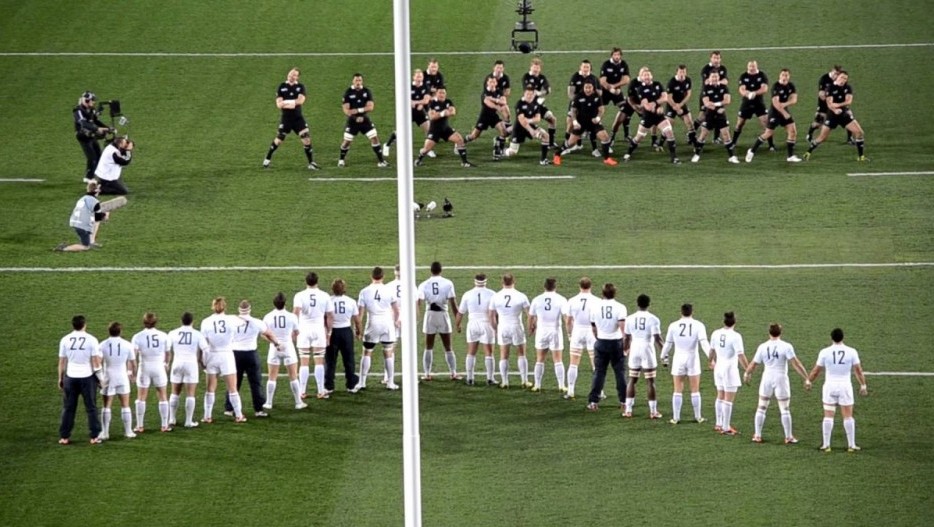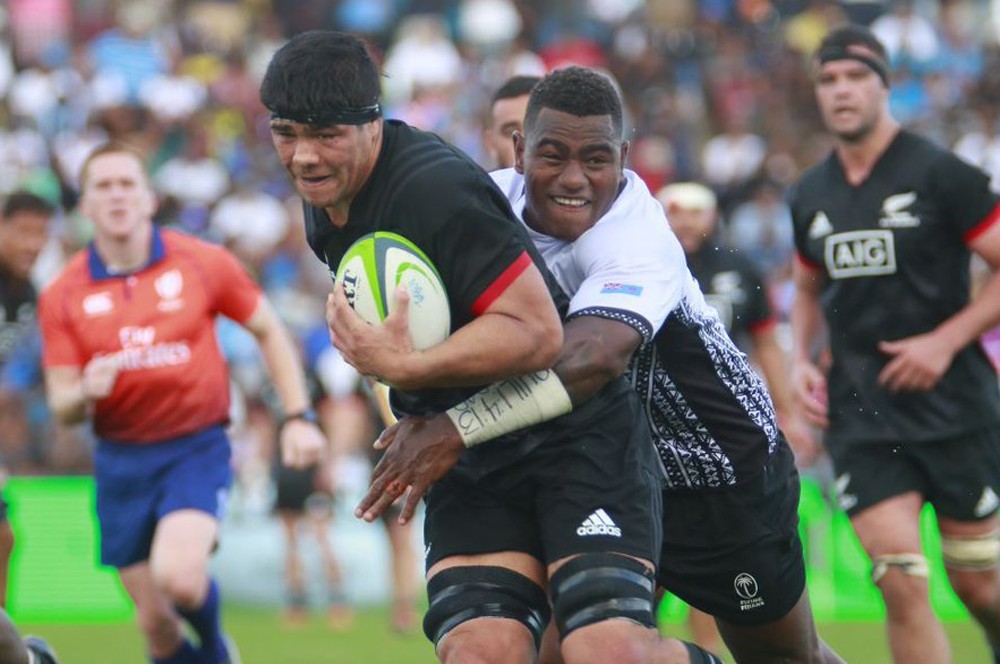While detractors of the Rugby World Cup often say that it is “always the same old teams” that win the Webb Ellis Cup, the reality is that the tournament has a very good record compared with other sports when it comes to the “same old winners” argument.
Instead, these critics are actually driving at something else without quite putting their finger on it.
What they actually mean is that the same old teams keep qualifying out of the first, round-robin stage; that, after a first round involving 40 matches, we keep coming back to the usual suspects.
Same old winners? No
Let’s get the ‘same old winners’ argument out of the way first.
Eight Rugby World Cups have been played so far, and four different countries have won it: New Zealand (three times), Australia, (twice), South Africa (twice) and England.
This compares favourably with even the football/soccer World Cup. The world’s biggest sporting event has been played 21 times since 1930 but only eight countries have ever won it.
That’s right: more than 200 countries play the sport, and the World Cup has been around almost 90 years, but only Brazil, Germany, Italy, Uruguay, Argentina, France, England and Spain have ever come out on top.
Rugby World Cup has a better winner’s ratio, in other words.
RWC also has a better record than basketball, whose latest World Cup saw Spain winning for only the second time, beating Argentina in the final.
While basketball is played in more countries than rugby, and has huge viewership and following worldwide, when you come down to it, it too is strong in only a handful of countries.
There have been 19 Olympic Games and 18 basketball World Cups — the two pinnacles of the sport — but only SIX countries have ever been champions, with the United States (15 Olympic gold medals and five World Cups) the clearly dominant team.
The next closest are two countries that no longer exist: Yugoslavia (six titles overall), and the Soviet Union (five).
Cricket, the sport closest to rugby in history and profile, has a similar record. Cricket sport has had 12 World Cups, and has had six different winners: Australia (5 times), West Indies (2), India (2), and England joining Pakistan and Sri Lanka in July as one-time winners.
We’ve looked at other sports, and the finding is the same: in every sport, whether team sports or individual ones, it always comes down to the same old winners.
Same old quarterfinalists? Yes
But while it is clear that the Rugby World Cup is no worse than other major sports in that regard, where RWC does fall down is when it comes to the teams that make it through to the final eight.
In all eight RWCs so far, FOUR teams have made it to the quarterfinals EACH AND EVERY time.
New Zealand, Australia, and France have qualified for that stage at every World Cup since the first one in 1987, while South Africa played in their first RWC only in 1995 but have qualified for the quarterfinals in every tournament since.
While having the big guns making the later rounds makes the tournament an easier sell for the organisers, when it comes to sporting competitiveness, having the same teams playing in the quarterfinals every time makes the tournament too predictable.
For example, veteran sports writer Simon Barnes once said that, when it comes to the Rugby World Cup, “I could tell you what the quarterfinal lineup will be for the next 20 years”.
To some extent, he is right.

Besides those four countries, four of England, Wales, Scotland, Ireland and Argentina regularly make up the quarterfinal lineup.
This only contributes to the perception that the Rugby World Cup, and indeed the rugby world is very much a closed shop.
Only three other teams have ever broken through: Pacific Islands favourites Fiji and Samoa have done it twice each, though the last time were the Fijians 12 years ago, while Canada have also made the last eight, but back in 1991.
Six Nations regulars Italy and Asian stalwarts Japan, who have both played in every World Cup, have yet to make the quarterfinal. Nor have the United States.
In the football/soccer World Cup, on the other hand, NO team – not one – has made all the quarterfinals of the past eight tournaments.
The most successful in that period have been five-time winners Brazil and four-time champions Germany, who have each made seven of the eight quarterfinals.
Two-time winners Argentina have qualified for five of the past eight quarterfinals, while current World Cup holders France are next on four, along with four-time champions Italy and the Netherlands, who have never won the World Cup.
Among this illustrious company have been the likes of Spain, Croatia, Uruguay, England, Belgium and Sweden, and lesser lights such as Ghana, Cameroon, Turkey, South Korea.
The regular appearance, then, of such teams is what people mean when they say the soccer World Cup is a much more competitive animal than the Rugby World Cup: there are always new teams threatening to upset the natural order of things.
Even cricket has a slightly more competitive final-stage record than rugby: Three teams have made the quarterfinals or super six in all the five times they have been held over the past eight World Cups: Australia, New Zealand and India.
More than anything else then, this coming Rugby World Cup, which many have described as looking like the most open and competitive of all, needs to see some new faces in the quarterfinals.
The rugby world, and the Rugby World Cup, needs to change the perception that it is a club for a few nations only; a closed shop.
It would be good to have a new winner, but more importantly, the tournament needs to have new quarterfinalists.
Upsetting the apple cart
So where might we see the ‘new faces’ at the 2019 RWC?
For a start, let’s say where it’s NOT going to happen, and that is Pool B.
Pool B, after all, has New Zealand and South Africa, two of the tournament’s hottest favourites, and none of the other teams in the group look likely to stop their march.
In fact, the only issue in this pool will be the matter of which team will finish first.
While it would be good to see the Italians finally make it to the second round, this Azurri team is not a vintage one and will not be able to overcome either the All Blacks or the Springboks.
Namibia and Canada have even less of a chance.
Also unlikely to come up with an outsider is Pool C, where England, Argentina and France will jostle for the top two positions, with the USA and Tonga likely to be no more than speed bumps on their respective journeys.
The most interesting issue for this group is whether, for the first time, the French will fail to make it to the quarterfinal.
Where the outsiders could come in
If there are going to be any upsets, then Pools A and D are where we have to look.
Pool D has two powerhouses, 2015 runners-up Australia and 2019 Six Nations champions Wales, plus dark horses Fiji.
Georgia and Uruguay will prove tough opposition but neither will have enough firepower to upset the other three.
Fiji, on the other hand, will prove either a major disappointment, after all the buildup and the powerful lineup they have assembled, or will prove the revelations of the tournament, beating either Australia or Wales, or even both.

What results that would be! It would mean not just a return to the knockout stages for the islanders for the first time since 2007, but could also mean that Australia will not make a quarterfinal for the first time, if they also lose to the Welsh.
Don’t rule it out.
But nothing would excite the sporting world more, not to mention send a whole nation into raptures, than if the hosts are able to beat either Ireland or Scotland, or both, to qualify for the quarterfinals for the first time.
Despite a recent loss to their 2015 victims South Africa, Japan have been in good form this year and Jamie Joseph’s men look up to the task of charting new territory for the Brave Blossoms. The schedule, for one thing, is very much in their favour: Japan will play Scotland in their last match, but Japan will have had a full wee’ks rest while the Scots will have to play just four days after meeting Russia.
Here’s to an upset or three
For the neutral fan and for the good of the game, in an ideal world, the RWC quarterfinalists would line up something like this:
Pool A: Ireland and Japan
Pool B: New Zealand/South Africa and Italy
Pool C: England/Argentina and Tonga
Pool D: Wales and Fiji
We’d settle for just one of those outsiders to make it.
Here’s hoping.
Related readings:
- French rugby union teams – comeback kings in RWC tournaments.
- Flying Fijians due for an outstanding World Cup?
- What the Six Nations results mean for the Rugby World Cup.
- Who drew the short straw in the RWC 2019 fixtures?


I’m not really a fan of sports but one thing I have observed is the same time that keep occurring in the semi finals and quarter finals which bore some people like myself who watches the game from afar because we sometimes predict the results of a game and that is it. So the idea of creating new teams should be encouraged to help boost the challenges in the game. Thanks for your time
Hm mm. Competition is the essence of sports. We want the best team to win, but preferably after a lot of fight from the other teams.
As the old cliche goes, you need a lot of milk for the cream to rise to the top!
This is really interesting to know. I knew there as it was in football where we get to see some of the top countries always in thee quarter and semi finals, same happens in rugby. In such cases, I fell there is only a little to be done here, other smaller sides should brace up and get ready, make yourselves a better player and build a stronger team and the line up will change just like we saw in football world cup of 2018.
Yes, it is up to the smaller teams to get their act together and improve. The strong team will always get stronger, so the weaker ones must work even harder to succeed. It can be done.
Rugby world cup has really been a closed affair over the years and I must say that I never truly paid attention to all of these details. The RWCA has always seen the dominant boys ruling over others everytime and this is asvlose as it could ever get especially with the current grouping. I do not see any of the outsiders to make the cut to the quarters and that would be like same story with the same individuals again. Bit let’s hope that upsets may cone up and the tides change. Thanks
I think that, for the growth of the game, there must always be new challengers. For example, in soccer/football, Uruguay, Italy, Brazil, Germany and England were the established superpowers teams for more than 40 years, but new powerhouses have since emerged, such as Argentina, France, Netherlands, Colombia, Spain and Belgium. It’s good for the game. Rugby must go through the same “revolution” in order to grow.
Lol, you really do have a big hope on what you’d expect for the upcoming rugby world cup quarters. That’s really interesting though and like for every sport, there’s always an expectation and this might be the reason why many people believe that one team will be the one with picking up the cut year after year. Its like in football club leagues, everyone has some expectation. Sometimes, they get broken but that’s with some rarity. We hope to see the best in the world cup even though I’m not a complete fan of rugby. Nice post.
Thanks. I think what keeps sports fans, especially neutral fans, interested is if there is genuine competition and there is a chance of a new team winning. Or if the usual big guns don’t have too easy a time. That’s all we ask
This is honestly an eyeopener, I have thought about this and truly what you written here doesn’t seem to be wrong, it has always been few predictable teams that makes it to the finals, making rugby sport predictable, hence the idea of establishing new teams can’t go wrong to make the game more interesting and competitive. The World Cup is around the corner and I just hope for a twist than the usual.
Yes, I think there will be more twists than usual in this World Cup. it is a completely new territory for most teams